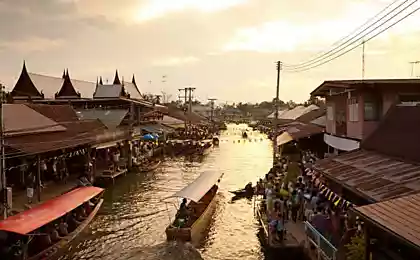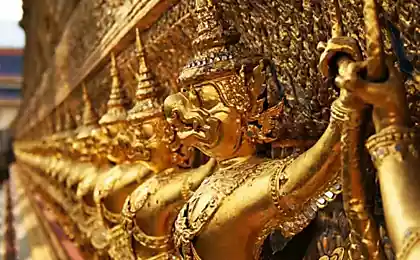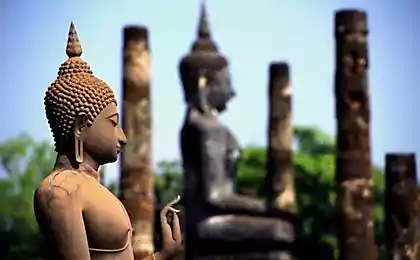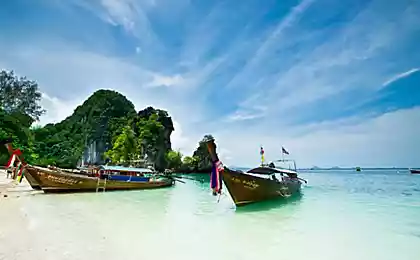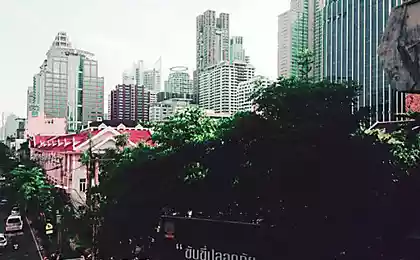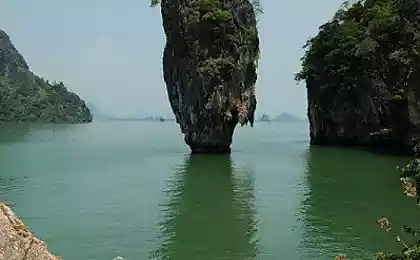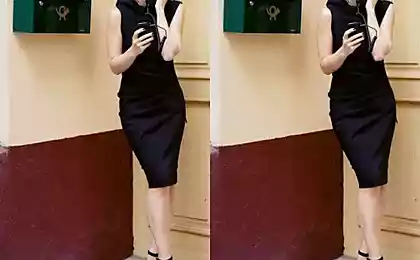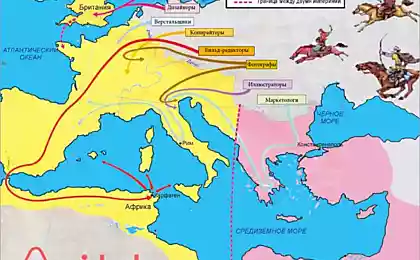1111
Upshifting for a programmer in Thailand

Probably, for many people, the act of “giving up everything and going to live in Southeast Asia” seems reckless, and even dangerous. Among us, IT specialists, there are many thorough people who are pedantic about the little things and want to calculate every step, every little thing, know all the risks, plan every detail of their lives. I’m such a person, too, and I would even say that I’m “sinning” much above average. Even before leaving for Thailand, all this caused me subconscious fear: to quit a good job, leave family, friends and leave without a return ticket. It went beyond my comfort state and was multiplied by a misunderstanding of close relatives. However, the whole idea was not terrible, as I originally imagined, and for almost a year my wife and I have been living comfortably in Tai. About various aspects of permanent life here, understanding which could help you to get rid of such fears, I want to write.

In recent months, Russian citizens have become concerned about legal stay in the Thai, as immigration authorities began to tighten the screws in visa wounds. For us, citizens of Belarus, absolutely nothing has changed - we do not have the opportunity to enter the Thai stamp. At the same time, from my point of view, visarans were, are and will remain an occupation extremely doubtful in terms of material gain.
The visa issue is solved very simply with money. In order to enter the country, you need to make a double or triple entry visa in advance. In Minsk, there is an office that makes such visas in Stockholm without personal application and any documents other than a passport. A double entry visa allows you to stay in Thailand for up to 6 months from the date of its issuance. At the first entry, you can stay for 2 months, then for $ 60 per person you can extend for another month. Then you need to leave and re-enter - the second entry of the visa will begin and you can stay in the country again for 2 months + 1 extension. Accordingly, a three-entry visa allows you to live in Tai for almost 9 months, although you will have to leave the country 2 times, but this can be combined with tourist purposes.
Such a visa is ideal for winterers, but for a longer stay you need something more reliable. This can be obtained at a language school by enrolling in Thai, English or other language courses, or even Thai boxing courses. The cost per person can be different, depending on how much you want to reduce the cost of your time:
- The training itself costs $500-$800.
- For a trip to Laos to apply for such a visa, you can spend about $ 200-300. In fact, it used to be possible to get this visa on the spot for $ 500, but now with the change of power, this opportunity seems to be covered up. We took advantage of it in March.
- By default, the visa is given for 3 months and must be renewed every 3 months in the local immigration (in my opinion, it costs $ 60). But we had the option of paying $400 per nose and extending it for 12 months at once, without having to go to immigration.
In total, we used the maximum package of services, did not go anywhere to apply for a visa, made an extension for 12 months and paid $ 3k for two. Considering that this allows you to stay in tai for 15 months (just 3 months + 12 months extension), as well as leave and enter any number of times, per person turned out to be $ 100 per month. That is almost comparable to the monetary costs of permanent visaranas from Russians.
As for training, we chose Thai and go 2 times a week for 2 hours. I chose a short course that lasted six months and cost $500. The wife chose the full course, it lasts a year and cost $ 800. As you can see, you could save a little more here. Classes are not stressful at all, it is even interesting to communicate with a diverse audience from different countries of the world.
Insurance/ We decided not to risk Belarusian insurance because of their complete meaninglessness. Russians, as far as I hear, like to use Consent, which has good coverage in terms of active sports and motorcycles. But I also heard that recently Consent changed its coverage from International SOS to something else and the quality of the service went down. In addition, they kind of banned the remote extension. In general, I can say little about this issue, but I think that if not already, then soon Russians will face the same problem of choosing insurance as Belarusians.
What could happen in Thailand? The most common problems are:
1) Fall from motorcycle
2) Tropical dengue fever (and in Cambodia, add malaria, which is much worse than in Thailand only in regions close to Cambodia)
(3) Urgent surgery is a type of appendicitis, but this has nothing to do with Thailand.
From problems 1 and 2 is not insured almost no insurance, or insure very limited. So we decided to take local (international) BUPA insurance. BUPA has about 6 plans, different in cost, which differ in the set of services and the amount of insurance compensation. We, trying to provide for everything, took the most expensive plan, which even provides for evacuation by helicopter from anywhere in Thailand, because the plans were a lot of travel. But as we have already realized, it was not necessary to overpay for it.
In total, we pay about $110 a month for two. The contract is for a year, paid in equal shares every month – they just withdraw that money from your Thai bank account (more on that later). In general, this gives us 2 personalized cards such as plastic, with which we can apply to any even the most expensive hospital in Thailand and we must provide all the necessary assistance. Further, the hospital deals with the insurance itself, we do not need any letters of guarantee or confirmation from the insurance. I didn’t have to and I hope I don’t have to. Insurance has coverage all over the world.
As for medicine in Thailand, different people characterize it differently, but I think that it is not worthwhile to take into account the opinion of packages, from which they try to rip as much as possible. With more, every major resort town has several hospitals, from cheap local to expensive Bangkok Hospital. In the city where we live, there are 3 large hospitals: Hua Hin Hospital, the cheapest, all Thais go there. San Paulo Hospital - private and medium-priced and standard Bangkok Hospital Hua Hin - space five-star hospital with the same space prices; as well as a small number of private practices, such as ENT, dentist, etc.
As a rule, a fall from a motorcycle ends with bruises and abrasions, possibly even extensive. With such a problem, you can contact the state. clinic, where first aid will be provided for inexpensively, wounds will be treated and some injection from tetanus will be injected.
Tropical dengue fever is something like our flu epidemic every year, most common during the rainy season (summer and autumn), but you can get sick in winter as well. Fever is carried by mosquitoes, or rather their special kind, which differ very well in white, I would even say as if glowing spots on the legs and body. We saw them on one of the jungle treks, and I thought they were bigger than normal mosquitoes, and they had very good white spots. Such mosquitoes breed in stagnant water and usually operate in the daytime in the area of 20 meters from the place of their withdrawal. To protect yourself during hikes, you need to wear body-covering clothes and use repellent with an active DEET component in the composition. If you live in a house, you need to make sure that rainwater does not accumulate on your site (pots, any containers on the street). As for natural reservoirs, I am not sure that there is a risk, because there are settlements of houses where canals are laid right in the village. It is unlikely that mosquitoes are planted there - most likely fish that feed on mosquito larvae live in the canals.
If you get dengue, then the likelihood of complications is small. We weren't sick, but our friends on Koh Samui got sick. I've been ill for over a week. Hospitalization may be required in case of severe disease, when the level of platelets in the blood decreases and there is a risk of hemorrhages. There is no vaccine yet, but there is hope that it will be available in the coming years. In general, it seems to me that in our society, people perceive tropical fevers as something almost deadly. The media publish terrible stories as tourists fell ill in Thailand or somewhere nearby and then came and were treated for a long time. In fact, dengue fever is very common in this region and local doctors know everything about it. Severe dengue fever affects only local residents due to periodic re-infection. Compared to influenza, the death rate from dengue in Thailand is lower. In order not to be afraid, you can read this article.
We have not faced any other health problems or risks. Snakes were not seen alive, only on the roads in crushed form. Some scary insects, too. It should be understood that the farther you are from the city, the higher the risk of encountering different animals, including snakes. By the way, the number of deaths from snake bites in Thailand per year is measured in only dozens of lives.
The issue of housing varies significantly in different cities. There are 4 types of housing:
1) Kondo is an apartment in a multi-storey house, usually furnished, as a rule, there is an opportunity to use a communal pool and a gym, which depends on the house itself, of course. Kondo is an ideal option if you do not have pets. Prices vary greatly, but we can say that this is the best option for the price / quality criterion. If you compare with the same Minsk – prices are much lower, the quality is much higher. Prices – say $200 to $1,000 or more for every taste and color. Pets are strictly prohibited unless it is served as a feature of the condo. We talked to the agent about it - hiding even a hamster is not an option. If someone sees one of the tenants, 100% will knock and you will be asked to remove the animal or clean yourself.
2) A townhouse is usually a 2-storey house with several two-level apartments, each with a separate entrance and shared walls with the other apartments of that house. Townhouse is the cheapest option, in some cases with animals. Because of the cheapness, Thais usually live there, there is no sound insulation, and Thais are very fond of karaoke - so this is not a good option for a long life.
(3) Home, there's nothing to write about. A house, a fence, can be a small or even a very large green area, your own pool. As a rule, the price of the house includes pool maintenance and a gardener. Houses can be both in the city and in the suburbs. Of course, the suburbs are cheaper and you can count on a good territory, but less infrastructure around. House prices range from $200 to infinity.
(4) Moo-ban – These types of houses are most commonly found in Bangkok and Hua Hin. The village is usually fenced with a high fence, at the entrance gate and round-the-clock security, video surveillance. There is a communal pool and gym. The price is slightly higher than a normal house. A village in the local sense does not mean a detached settlement, it is just a fenced area with its name and a group of houses in a single architectural style. The village can be both within the city and in a clean field.
Some nuances about rental housing:
- Usually a deposit of a monthly lease is required. The pledge is returned after eviction and checking the condition of housing. Also, if agreed in the contract, a certain amount is deducted from the pledge for cleaning the house after departure.
- If you rent directly from the owner, and not through a real estate agency - be prepared that the pledge may not be returned. In this case, you should not leave the house immediately before leaving somewhere, but it is worth going for a week to some guesthouse. Then you can tell the owner that you are moving to another house / condo and he will not be “late” to bring you a deposit, and you will not rush to the plane.
- Having a house with a private pool is not very advisable, because as a rule, such a pool is small, i.e. fluffy and you do not swim in it. But if there is a filtration system, it will eat a lot of electricity.
- Rental prices in winter are higher than in summer. Often, when renting for a period of one year, you can achieve a significant discount. As a rule, a profitable offer can be found in the spring, when all tourists / winterers leave and there is an excess of supply on the market.
For many, Thailand is probably associated with a hot climate, stuffy and other “charms” of tropical life. But that's not entirely true. The nuance is that after a while the body gets used to the high temperature and the climate begins to feel completely different. I can't stand the heat myself. When we arrived in November, it seemed unbearably hot. The air conditioner had to be turned on at night to somehow fall asleep. The rainy season was coming to an end, the “cold” season began by Thai standards, of course, while far from ours. When December came, it was a little cooler. Towards the end of December, the temperature at night began to drop to 24-25 degrees and here we began to freeze. Since the end of December, all of January and almost all of February, we have not used air conditioning even during the day. Despite the clear sky, the temperature during the day did not reach 30, at night we closed all the windows, otherwise it was cold to sleep. I must say that in Hua Hin in December and January, the season of strong winds, so the windows specifically blew. We forgot about the pool for almost 2 months because of the cold, as we thought, water. About the sea, too. However, the Thais say that this winter was abnormally cold for these places.
It got a little warmer in February. Since mid-March, a rapid rise in temperature began, and by early April it became hot. There was no time to go outside, no cloud in the sky every day. The water in the sea became very hot, I would say in shallow water above 33 degrees. In the tropics, it gets dark at about 6 all year round. In spring, everything around usually comes alive after 5 p.m., markets open, there are more people on the street. The heat lasts all of April and almost all of May. In mid-May, the weather begins to change. If earlier the sky is clear from morning to evening, then from mid-May afternoon clouds appear. They close the sky closer to 4 pm, there may be a little rain, which does not bring coolness. By night, the clouds stretch.
Since June, the cloudiness is getting more, the heat gradually recedes, many places in Thailand begins the rainy season – but not in Hua Hin. There is some enchanted place, probably due to the peculiarities of the landscape (from the west of the mountain, to the east of the bay). You can often see a picture of black clouds gathering over the mountains or over the sea in the evening and lightning flashes, but in Hua Hin there is no rain and the blue sky above your head. There are days when the sky tightens as in Minsk - gray and dark.
Next July, August, early autumn – what will happen next we do not know yet. But it already feels cool in the air, it becomes comfortable to be outside. The air conditioner, exposed at 28, works only during the day, at night it is turned on only occasionally. The active rainy season in Hua Hin is August and September.
What is especially good Thailand - the opportunity to travel a lot and safely. The country has more than 100 national parks, where there is a lot of interesting things. I've never driven a right-hand drive before. It was scary. And then we booked a car right from the airport, and I realized we did the right thing. The road from the airport in Bangkok is the best way to learn to drive. 4 lanes, few cars. During this time, you can get used to other management. Forget about switching turn signals up to at least 2,000 kilometers - you will still often turn on wipers on the machine. But in general, after 2 hours of leisurely driving on the highway, you already get used to it. On the first day in Tai, I drove 700 km and a week later, another 900 km.
Trails in Thailand are organized so that the opportunity to turn and go on the opposite you will almost not. If you need to turn right through oncoming traffic, then as a rule, you need to drive further, turn around and already returning to turn left, where you immediately go into your lane. Places for a turn on the tracks are almost every 5-10 km, for a turn, as a rule, a pocket is created on your lane and on the oncoming lane. Turns have one big drawback - in the right lane (the fastest) are often slow-moving trucks, trucks, etc., which go to the nearest turn. Because of this, it is often necessary to adjust to a slow lane to advance.
The movement itself, especially in cities, I would call calm (although I did not go to the BPC itself). Thais are slow, this is caused by both mentality and the presence of a huge number of bikes on the roads, which everyone is trying to miss and in general their attitude to bikes is completely different from ours. It is safe to say that every Thai is both a driver and a biker at the same time, since the bike is the most convenient form of transportation in cities. In general, with rare exceptions, they do not make sharp maneuvers and rearrangements, do not interfere with each other. But they like to drive on the opposite side of the road, including by car. You also need to be prepared that the Thais can greatly reduce the speed up to a stop in the lane near the curb, move very slowly (20-30 km / h). Due to the large number of bikes on the roads and in the cities, the roadside is wide, almost like 3/4 lanes - it is mostly ridden by bikes.
Renting a car in itself does not have any problems if you rent from large offices. For rent it is better to use the service rentalcars.com. We came across a variety of offices and no one had any problems or scratches. As a rule, your card blocks $ 300 or $ 600 deposits, which are automatically unlocked anywhere from a week to a month – I don’t know what depends on it, but there were different deadlines. It is worth considering when renting a car that some of your available money can be frozen for up to a month. And in no case do not require anywhere to leave any documents on bail. If someone asks you for documents on bail, you can get divorced. Offices we used: Thai Rent a Car, Budget, AVIS. All offices include franchise insurance (called CDW or Collision Damage Waiver), where you pay a small amount, the rest is paid by the insurance. We didn’t, so I won’t tell you how it works. In large offices, you can take a car in one direction, rent it in another city. It costs more, but sometimes there is no other option. On average, renting an inexpensive sedan on a machine for the weekend costs $ 70-100. I expected prices to go down in the off-season, but it didn’t.
The infrastructure on the roads is well developed. Many network gas stations have round-the-clock shops 7/11, cafes, coffee shops, makashnitsya. The quality of the road surface is better the closer to Bangkok. Highway 4 from Bangkok to the south, the only road you can take to the south of Thailand, after Hua Hin, has clear pavement problems. Traffic is intense even on weekends. Sometimes I get the impression that Thais work without a weekend, because on any day of the week there are a lot of trucks and trucks.
Navigator (you can rent with the car) may be needed in Bangkok, because there are very not obvious multi-level interchanges. Otherwise, above the roof there are enough Google maps.
What are the national parks? This is the area around some natural attraction, or several if the park is large. For example, a beautiful mountain range and several karst caves in Khao Sam Roi Yod Park, a coral reef in Hat Wanakon Park, several stepped waterfalls in Erawan Park, a lake in a karst fault in Khao Sok Park, etc. Each park has so-called headquaters, which usually has a small exhibition of photos or exhibits from the park, information posters, showers, toilets, rental houses, a cafe, a parking lot and a camping area. In some large national parks, camping can be organized in several places, near popular attractions. Camping always has toilets, showers and a cafe. The use of your grill is not prohibited. It is also usually possible to rent a tent, sleeping bags, mats and pillows for $5. You can buy a tent and sleeping bags in any large Tesco - we did, and take pillows from home. If anyone thinks why sleeping bags are so hot, wait. We were in April in the hottest season in the camping on the sea and at night together climbed into the bedrooms. Many people come to parks with tents on weekends. Thais behave culturally, drunken screaming cattle like we don't have.
Since November, we have visited only 7 (out of more than 100) national parks in Thailand. In some parks you want to come again, in some parks there are so many interesting places that you can not see them all in one weekend, the waterfalls look different in different seasons. In general, I think, not repeating myself on weekends, you can go and watch all year. True, the distances are large and now we have already come to the fact that we have already been to all the nearest national parks, we have to plan longer trips not for 2, but for 3 days.
If you think that in Tai you can eat only rice and seafood, or only makashnits – then you are very mistaken. In tourist cities there are many cafes, where they prepare delicious steaks from Australian beef at a price of 2 times cheaper than Minsk. For example, in Hua Hin Market Village there is a restaurant Sizzler, where you can choose a steak with a side dish from $ 8 and use a huge salad bar for free.
Large grocery stores have any products - milk, yogurt, cheeses, a huge selection of meat, vegetables and fruits. I would like to say a lot about raw meat - there is no such choice and such prices in Belarus! There's even crocodile meat. It should also be taken into account that Australia and New Zealand are close by, from where beef and dairy products of good quality are brought. In some “premium” stores, you can buy the same buckwheat if someone likes it.
Mobile communication is simple as rakes - at the airport you can buy a SIM card and use it, constantly replenishing in the nearest 7/11. There is no fee, pay only for calls or traffic. Fixed internet is usually provided by the homeowner, it can be either shared WiFi or a dedicated channel. We're allocating 12 megabits, we're paying $20 for the Internet.
A foreigner can open a Thai bank account and link PayPal to it. There are no specific instructions for opening accounts by foreigners, so different banks and even different branches of the same bank may allow you to open an account. We used Bangkok Bank and opened 2 accounts the first time. To open an account, you just need to come with a passport, in an hour they will issue everything and give you an unnamed card and some book for records (well, she does not know why). In a week or two, you will be sent data for online banking and then you can link PayPal. We also need this account for insurance, a monthly fee is deducted from it every month.
It so happened that in Thailand the military often come to power. In short, there are 2 elite groups in Thailand: those close to the King of Thailand and the Shinawatra clan. The people love the king madly, but the king has become old and can no longer rule the country. When the Shinawatra clan came to power, they began using populist methods to distribute money to the poor right and left, which attracted a significant part of the ordinary peasant population in the country (which is the majority). This has also been accompanied by increased corruption in the country. All would be well until Shinawatra encroaches on Thailand's holy of holies, the monarchy. He was thrown down by the military and sent into exile. After some time, elections were held in the country and the Shinawatra clan in the person of his sister won them. She continued to pursue her brother's populist policies, and in May, after a long street standoff between the pro-royal opposition and Shinawatra, the military took power again and dismissed Shinawatra.
The essence of the problem is that if elections are held tomorrow, someone from Shinawatra will win. The military, like the opposition, does not want this. Because they believe it will continue to divide Thai society. They want to carry out cunning electoral reform so that even if the majority of the population supports the Shinawatra clan, they cannot come to power again.
What happened in the country during the protests from November to May is absolutely nothing. Life went on as usual, only in the center of Bangkok held rallies and blocked traffic.
What has changed in the country since the seizure of power by the military – absolutely nothing. Life goes on as usual, only now in the center of Bangkok and anywhere else can not hold rallies. At first, a curfew was imposed from 10 p.m. to 5 a.m. This caused some inconvenience in the fact that around-the-clock shops closed for the night, and shops that usually worked until 10 began to close 2 hours earlier. The curfew was further reduced. It was then cancelled in a number of tourist towns and then across the country.
The country now lives under “military oppression,” but the fact is that most people are even happy about it. First, protests and escalating tensions have ended. Second, the military junta has voiced initiatives to root out many of Thailand's longstanding problems, which have hampered both tourists and locals. We'll see.
If you are tired of the gray everyday life of Minsk / Moscow / another city and you want to change the situation, change your life in a more active and interesting direction - there is no better and more convenient country than Thailand. In fact, you can come here on a regular tourist visa with a small capital in your pocket and easily settle down for a year, two or more. The only thing you should not believe the tales about downshifting in Thailand. Living in Thailand on $500 a month is probably possible – but I wouldn’t call it a comfortable and interesting life. You will constantly have to limit yourself in opportunities, comfort, travel, food.
Should I? This is another question, and everyone has their own answer. But you can always live in your native country, in a year, in two, in ten, it will not get away from you. And who knows, Thailand will be as comfortable and hospitable in a year, two, ten years.
Source: habrahabr.ru/post/228105/
Smart watches Pebble. Personal experience of using
Charles Hertzfeld: Director of DARPA and the godfather of ARPANET


